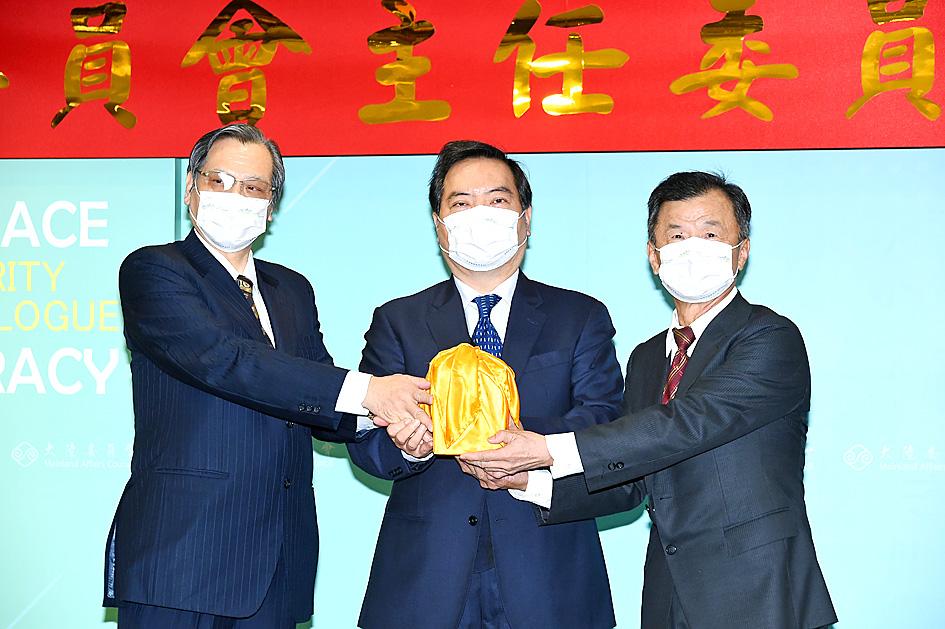New Mainland Affairs Council (MAC) Minister Chiu Tai-san (邱太三) yesterday at his swearing-in ceremony pledged to do his best to break the cross-Taiwan Strait impasse without sacrificing the nation’s sovereignty, but offered no specifics on how he planned to achieve it.
Former National Security Council adviser Chiu said in his address that Taiwanese and Chinese are anxiously hoping that they can resume normal exchanges once the COVID-19 pandemic is properly contained, pledging to do his best to meet the public’s expectations to end the cross-strait standoff and improve ties, while upholding Taiwan’s sovereignty and democratic system.
Chiu was sworn in to succeed Chen Ming-tong (陳明通), who was named National Security Bureau director-general.

Photo: Tu Chien-jung, Taipei Times
Chiu, a 64-year-old former lawmaker and prosecutor, served as President Tsai Ing-wen’s (蔡英文) minister of justice from 2016 to 2018, and held the No. 2 post at the MAC from 2004 to 2005 in a previous Democratic Progressive Party administration.
His appointment was part of a reshuffle of three Cabinet-level officials announced by the Presidential Office on Friday last week.
The appointment of Chiu could be seen as a friendly gesture to Beijing, as Chiu is known to be dovish in his approach to cross-strait issues, academic Chao Chun-shan (趙春山) has said.
Beijing has taken a hardline stance on cross-strait relations. It cut off dialogue with Taipei after Tsai took office in May 2016 and refused to accept the so-called “1992 consensus.”
The “1992 consensus” refers to a tacit understanding between the Chinese Nationalist Party (KMT) and the Chinese Communist Party that both sides acknowledge there is “one China,” with each side having its own interpretation of what “China” means.
The DPP contends that the consensus never existed and is “a mere illusion,” because China does not recognize the principle that each side is free to interpret “one China” as it sees fit.
Asked about the so-called “1992 consensus,” Chiu said that Beijing’s version focuses on the “one China” part of the formula, which sees Taiwan as part of the People’s Republic of China, “which is unacceptable to Taiwanese.”
Beijing’s continuous insistence on the “1992 consensus” and the “one China” principle as the basis for cross-strait exchanges is detrimental to Taiwan-China relations, he said.
Chiu called on Beijing to “be more practical” in pushing for cross-strait interaction to enhance mutual trust.
Separately yesterday, the Ministry of National Defense held a closed ceremony for the inauguration of new Minister of National Defense Chiu Kuo-cheng (邱國正), who was formerly National Security Bureau director-general.
Chiu Kuo-cheng succeeds Yen De-fa (嚴德發), who was handed an advisory role with the National Security Council.
Minister Without Portfolio Lo Ping-cheng (羅秉成), who presided over the ceremony, said that Chiu Kuo-cheng is an exceptionally capable official and the government has high hopes for him as the new leader of the ministry, the Military News Agency reported.
Additional reporting by Aaron Tu

The Grand Hotel Taipei on Saturday confirmed that its information system had been illegally accessed and expressed its deepest apologies for the concern it has caused its customers, adding that the issue is being investigated by the Ministry of Justice Investigation Bureau. The hotel said that on Tuesday last week, it had discovered an external illegal intrusion into its information system. An initial digital forensic investigation confirmed that parts of the system had been accessed, it said, adding that the possibility that some customer data were stolen and leaked could not be ruled out. The actual scope and content of the affected data

DO THEY BITE IT? Cats have better memories than people might think, but their motivation is based entirely around the chance of getting fed Cats can remember the identity of the people who fed them the day before, Taipei-based veterinarians said on Friday, debunking a popular myth that cats have a short memory. If a stray does not recognize the person who fed them the previous day, it is likely because they are not carrying food and the cat has no reason to recognize them, said Wu Chou Animal Hospital head Chen Chen-huan (陳震寰). “When cats come to a human bearing food, it is coming for the food, not the person,” he said. “The food is the key.” Since the cat’s attention is on the food, it

‘LIKE-MINDED PARTNER’: Tako van Popta said it would be inappropriate to delay signing the deal with Taiwan because of China, adding he would promote the issue Canadian senators have stressed Taiwan’s importance for international trade and expressed enthusiasm for ensuring the Taiwan-Canada trade cooperation framework agreement is implemented this year. Representative to Canada Harry Tseng (曾厚仁) in an interview with the Central News Agency (CNA) said he was increasingly uneasy about Ottawa’s delays in signing the agreement, especially as Ottawa has warmed toward Beijing. There are “no negotiations left. Not only [is it] initialed, we have three versions of the text ready: English, French and Mandarin,” Tseng said. “That tells you how close we are to the final signature.” Tseng said that he hoped Canadian Prime Minister Mark Carney

President William Lai (賴清德) yesterday bestowed one of Taiwan’s highest honors on Saint Vincent and the Grenadines (SVG) Ambassador Andrea Clare Bowman in recognition of her contributions to bilateral ties. “By conferring the Order of Brilliant Star with Grand Cordon on Ambassador Bowman today, I want to sincerely thank her, on behalf of the Taiwanese people, for her outstanding contribution to deepening diplomatic ties between Taiwan and SVG,” Lai said at a ceremony held at the Presidential Office in Taipei. He noted that Bowman became SVG’s first ambassador to Taiwan in 2019 and